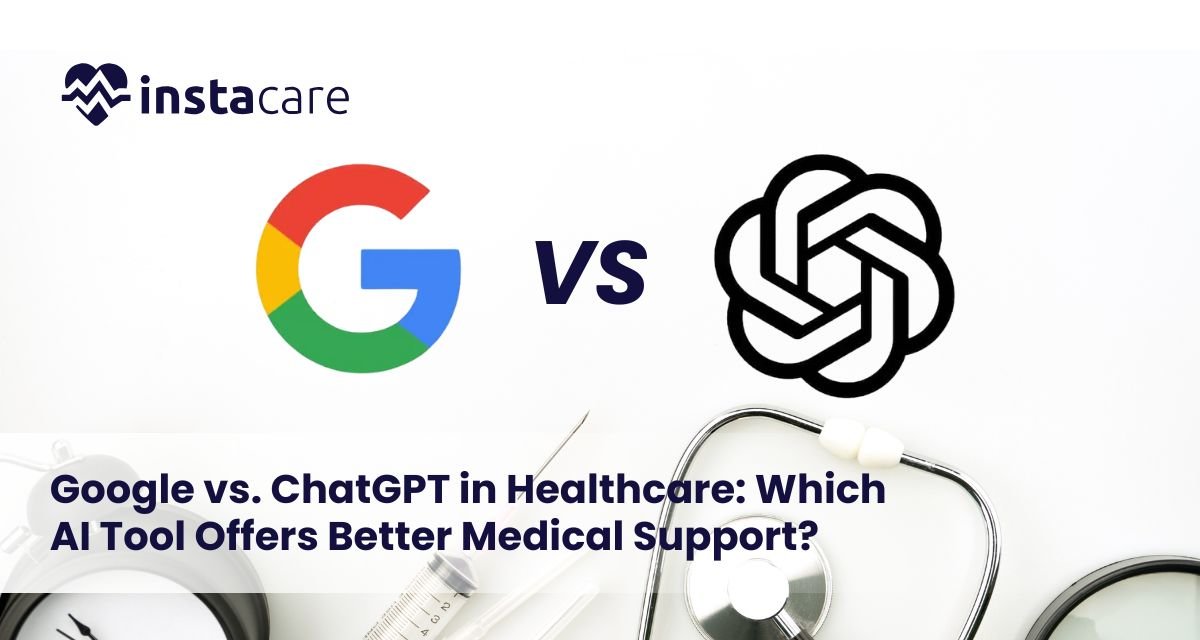Last updated on Thursday, 27, November, 2025
Table of Contents
Google vs. ChatGPT in Healthcare: Which AI Tool Offers Better Medical Support?
Artificial Intelligence (AI) is revolutionizing healthcare by providing quicker access to information, improving diagnostic precision, and even automating patient support. Two organizations are leading the way in this revolution: Google and ChatGPT. Both leverage strong AI capabilities but apply them to medical support in very different ways.
Google’s AI is mostly used to fuel search algorithms and health-oriented platforms such as Google Health and Bard, whereas ChatGPT, designed by OpenAI, is more of an interactive assistant with dialogic formats. Both offer strengths, but which provides superior medical assistance?
Knowing the AI Tools
● Google Health AI Tools
Google’s activity in healthcare is diverse. The firm uses Google Search, Google Health, and Bard AI, combining AI-infused search intelligence and deep learning algorithms to achieve real-time health monitoring, imaging diagnostics, and predictive modeling. Google also partners with organizations such as the Mayo Clinic to improve diagnostics through AI models in patient care.
Google Search enables users to input symptoms or health conditions and have instantly available a list of links, articles, and occasionally summaries. Google has brought conversational AI into the equation with Bard AI, providing direct, chat-based answers rather than merely blue links.
● ChatGPT for Medical Advice
ChatGPT is intended to interact with users in natural conversations. Having been trained on large sets of data, including open-source medical literature (not individual patient data), ChatGPT for medical advice can provide general medical information, break down symptoms, and describe diseases or medications.
While ChatGPT is not a substitute for a physician, it is being more and more utilized in patient education and healthcare decision support systems. As a doctor chatbot, it offers readable and bite-sized information to users, particularly for people drowned in the intricacies of conventional health material.
Speed vs. Context: How They Provide Medical Information
● Google: Speed-Oriented Delivery
Where speed of search is concerned, Google is unmatched. A user can type in symptoms such as “nausea and headache” and obtain thousands of responses within a couple of milliseconds. Google’s power is in its full-indexing and real-time information retrieval.
But Google results are apt to be filtered through several sources. Although this may suit tech-literate users, it drives others crazy. And SEO content is not necessarily always prioritizing medical correctness over clickability, leaving one to question the limits of Google Health AI tools.
● ChatGPT: Context-Rich Conversations
ChatGPT strikes a different path; it slows down but deepens. Rather than blinding users with hyperlinks, ChatGPT gives them streamlined, conversational responses.
For example, a user inquiring about “possible causes of chest pain” gets a formatted, human-style explanation, graded by severity and emergency. This renders ChatGPT’s medical precision more user-friendly, particularly for non-professionals.
Furthermore, ChatGPT can recall a conversation flow, which a search engine cannot. This capacity to preserve context across a series of interactions makes possible AI-powered personalized health recommendations AI advice a capability search engines cannot match.
● Patient Trust in AI Tools
The real measure of medical AI tools lies in how much users trust them. Research shows that patient trust in AI tools and they often use both platforms for initial health queries, yet differ in what they rely on more.
● Trust in Google’s Health Ecosystem
Google enjoys high user trust due to its long-standing reputation. However, its model lacks empathy and adaptability. It doesn’t remember conversations or tailor information unless you’re using an account with personalized tracking.
Additionally, searching through results requires discernment users need to sort out verified sources such as Mayo Clinic or WebMD from suspect blogs. This puts the responsibility for ChatGPT’s medical accuracy on the user.
● Trust in ChatGPT Medical Chatbot
ChatGPT establishes trust through its friendly conversational tone. Patients value having a non-judgmental, always-available aide to field personal health inquiries.
Its answers incorporate disclaimers, urging users to refer to medical professionals, a function that enforces ethical concerns of AI in medicine, issues of AI in medicine, and demonstrates prudent AI application. The human-like answers also make it perfect for emotional illness discussions, where empathy is paramount.
Real-Time Diagnosis with AI: Are We There Yet?
Neither Google nor ChatGPT is currently approved for real-time diagnosis with AI. Google has tested AI in radiology and ophthalmology with very good results, but clinical use is still confined.
ChatGPT is utilized in triage systems, symptom checkers, and virtual health assistants. While useful, it’s not a diagnostic program. In both instances, the technology is ancillary, not determinative.
But AI model advancements in patient care indicate this can turn around. Google is piloting AI systems for cancer screening, and ChatGPT-type models are being trained on up-to-date medical data for improved clinical application.
Book Your Free Marketing Consultation
ChatGPT vs. Search Engines: Which Provides More Support?
This is a comparative analysis:
Google (Search/Bard)
- Speed: Lightning quick; brings back thousands of results in seconds.
- Personalization: Restricted to search history; not strongly personalized for people.
- Medical Accuracy: Dependence on the source clicked (some authoritative, some not).
- Ease of Use: Manual filtering, reading, and clicking through several links.
- Emotional Sensitivity: No empathy or emotional sensitivity.
- Offline Integration: Poor integration with healthcare equipment or APIs.
- Trust Factor: High based on brand reputation, but impersonal and non-interactive.
ChatGPT (AI-Powered Assistant)
- Speed: Slower than search engines, but delivers well-structured answers.
- Personalization: Highly tailored to continued conversation and context.
- Medical Accuracy: For the most part, accurate and consistent, with obvious disclaimers.
- Ease of Use: Straightforward, interactive, and chatty, no need to exit the chat.
- Emotional Sensitivity: High; answers with sympathy and a human-like tone.
- Offline Integration: Integratable into health systems and apps using APIs.
- Trust Factor: Medium to high; conversational tone encourages user trust, particularly in sensitive areas.
The main point: Google is ideal for scanning numerous sources in a short time, and ChatGPT is ideal for leading the user through lengthy health-conversation-type interactions.
The Future of Healthcare AI
AI in medicine is changing from simple support to smart decision-support systems. Both Google and ChatGPT are pouring significant resources into the transition.
Google is working on clinical-grade AI solutions, predictive analytics, and imaging. ChatGPT is emerging as the foundation for healthcare chatbots, mental health sites, and AI-fueled patient education.
In the future, a combination approach could become the norm. One could envision a system where ChatGPT offers the emotional and contextual aspect, and Google provides research-driven information, both potentially integrated into Clinic Management Software. Together, they would make the ultimate digital health aide.
Conclusion
So, ChatGPT versus Google in healthcare, who prevails? It depends on your requirements. For rapid searches and varied sources, Google is still the way to go. For interactive assistance, clarity, and emotional intelligence, ChatGPT stands out.
Neither one is a substitute for physicians, but both have their uses in enhancing the accessibility of healthcare, providing support, and increasing AI literacy in patient care. As we transition to a future of AI in healthcare, trust, ethical application, and medical confirmation will decide the path these tools will take. The ultimate victory will be achieved when AI becomes a trusted partner for patients and professionals alike, providing not answers, but actual support.
FAQs
1. Can ChatGPT substitute a doctor for medical advice?
No. While ChatGPT gives lengthy, conversational answers regarding symptoms, drugs, and illnesses, it’s not a qualified medical expert. It’s most helpful for initial comprehension, but not for diagnosis or treatment.
2. Is Google Health AI trustworthy for health questions?
Google offers quick access to plenty of sources, but accuracy is what you get. Utilize good sites such as the Mayo Clinic or WHO, particularly when making decisions concerning your health.
3. Which is more appropriate for mental health assistance, ChatGPT or Google?
ChatGPT is normally more helpful for mental health discussions because it is more empathic in its tone and conversational in nature. But still, it cannot replace professional therapy or counseling.



